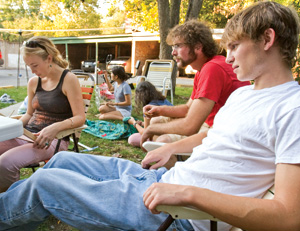 Scott Bressler
Scott BresslerThe Burning Kumquat isn’t really going to burn anything, as the name suggests. But this new student group is starting an herb and vegetable garden next to the Alumni House in the spring.
The group hopes to promote awareness of small-scale sustainable practices in farming, as well as green living in general.
“It’s a chance for people to participate hands-on with their food,” said senior Ellen Madden, who is in charge of the group’s publicity. “A lot of it has to do with awareness and community building. It’s very accessible for anybody on campus.”
Sophomore Ted Erker, president of The Burning Kumquat and an environmental studies major, thought of the idea after thinking about where food comes from.
“I realized that I didn’t know anything about how some of our most common foods grew,” he said. “I don’t think I had seen rice growing in dirt until I started working in the greenhouse here. Food is so fundamental to everything about people, and I felt I was disconnected and incredibly ignorant of the things I ate.”
As he learned more about the process, he decided that starting a small farm would be a great way to “reconnect to the land” and teach others too.
The Burning Kumquat has yet to decide which vegetables it wants to grow, but will look at group input and information from its research committee. Washington University Grounds Manager Paul Norman will help them till the land if necessary or build raised beds in order not to dig it up.
“We’ll do all the proper work up until planting season starts,” said Madden.
Once the garden starts up in the spring, the group’s head farmer, Meghan Lewis, will oversee the watering, weeding, harvesting and other such tasks involved in maintaining a garden. Everyone, however, is encouraged to take shifts during the week, especially in the summer when most of the work is done.
Currently the group, which had more than 100 people at its last event and has about 30 regular members, is flyering the campus and plans to hold a hoedown, pumpkin carving and other informational sessions later in the semester, according to Madden.
“We wanted to be sure we have all the visual stuff set up,” she said. “And we want to be as low-impact environmentally as we can. All printed material is on reused fabric except for public informational pamphlets.”
While most of the produce will go to Feed St. Louis, the group hopes to have a stand available for students to purchase food. It has also been working with Gateway Greening, New Roots Urban Farm an-d City Seeds–local environmental groups that have shared supplies and knowledge with The Burning Kumquat in exchange for volunteer work. Erker volunteers at City Seeds every Friday.
“My personal hope is that students, in addition to learning about the food production system and alternatives to it, can work and grow their own food with their own hands and share it with the community,” said Erker.
Madden has similar goals.
“We’re hoping to be part of the awareness of how to make a little bit of an impact on a lot of environmental issues facing our world and what it takes to make food so that it’s not taken for granted,” she said. “It’s great to see so many people excited about it.”